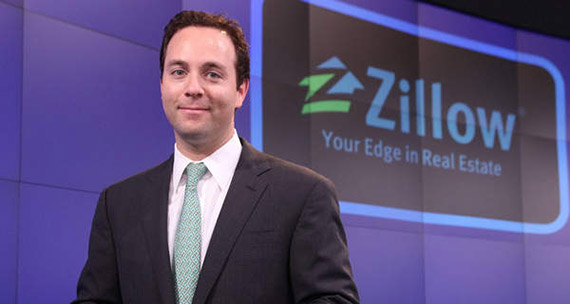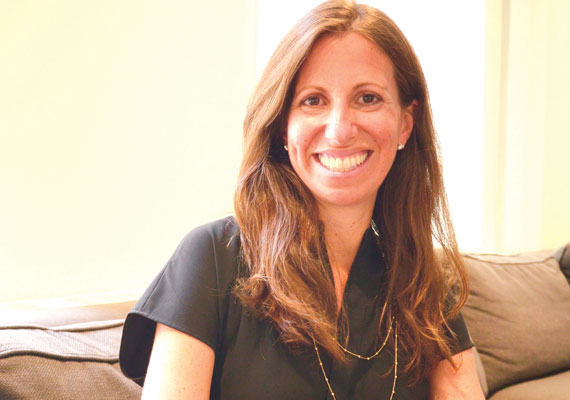Susan Daimler, who has already started and sold two startups, said success requires “thinking big and taking risks.”
Susan Daimler drove west to Silicon Valley at the height of the tech boom in the late 1990s — a trendy, but prescient move. Now 38, the New York native has become something of a serial entrepreneur. She’s already founded and sold two startup companies.
But Daimler’s latest gig, running the listings portal StreetEasy, is a different beast entirely.
After being tapped to lead the site in 2013, it’s now up to Daimler to monetize the nearly 10-year-old company and grow its audience.
Despite its already-huge following, New York residential brokers have had a love-hate relationship with StreetEasy since it launched in 2006, and especially since its acquisition by Seattle-based Zillow in 2013. With no local multiple listings service in New York, StreetEasy has been a great equalizer, arming agents and their clients with more data, while at the same time fueling a fear among agents that they could one day be replaced. In recent months, the underlying tension between StreetEasy and brokers has intensified, sparked by StreetEasy’s introduction of a new agent-advertising program.
And not surprisingly, much of the criticism has been lobbed at Daimler.
Daimler is well versed in the two spaces — technology and real estate — that StreetEasy operates in. One of her startups, the real estate shopping platform Buyfolio, was bought by Zillow, which went public in 2011 and had more than $300 million in annual revenue in 2014. This year, its annual revenue is projected to be more than $600 million.
Whether those startup successes help in her current position remains to be seen, with some complaining about the “Zillowfication” of StreetEasy’s search functions.
In June, Daimler and veteran agent Robby Browne, now at Corcoran, went head-to-head at a real estate forum organized by startup brokerage Compass, after Browne pressed Daimler for further details on the agent-advertising “Building Experts” program.
As Daimler defended the program, Compass President Leonard Steinberg jumped in to deflate the tension.
“StreetEasy is about sharing information and making money doing so,” he later told The Real Deal. “Whereas we prefer they did it for free, that’s not the real world.”
Twice a winner
The mercury was pushing 93 degrees in mid-July when Daimler, speaking at StreetEasy’s headquarters at 130 Fifth Avenue, outlined her vision for the company.
A Long Island native, Daimler studied English at Johns Hopkins University, where she met her husband, Matt, and is now a trustee. “The minute we graduated [in 1999], we went from the East Coast and drove West, so I think there’s always been this interest in technology and what’s coming next,” said Daimler, who landed a job in email marketing at a division of ad agency TBWA Worldwide.
In 2001, while living in Seattle, the couple, both avid travelers, founded SeatGuru, a website that gives users flight schedules and seating arrangements. In 2007, the Daimlers sold the company for an undisclosed sum to online travel site Expedia.
Against the odds, the couple did it again a few years later.
By this time, they had relocated to New York to be near family. After a frustrating apartment search, they launched Buyfolio, an online platform where buyers could share and discuss listings with agents. In 2012, Zillow — which was co-founded by Expedia founder Rich Barton, a former Microsoft executive — came calling and bought Buyfolio for an undisclosed amount.
After selling Buyfolio, the Daimlers, who live in Soho and own a home in Southampton, went to work for Zillow. A short time later, when Zillow bought StreetEasy, Susan was brought on to head the company’s New York operations as general manager of StreetEasy and vice president of Zillow NYC. While Daimler has plenty of experience on the tech side, this is her first time actually leading a company she didn’t start — though Matt Daimler said his wife’s management style and overall business acumen has evolved since the startup days. Matt Daimler, Zillow’s vice president of strategic initiatives, said in those days, his wife wore many hats and could “have a conversation at lunch and make things happen in the afternoon and see the results in the evening.”
 Susan put it this way: “It builds accountability [because] there’s no one else to look at. It’s not like, ‘Oh, it was that guy’s job.’ It was your job,” she said.
Susan put it this way: “It builds accountability [because] there’s no one else to look at. It’s not like, ‘Oh, it was that guy’s job.’ It was your job,” she said.
Besides being an early champion of emerging technologies, Daimler is, in her own words, not averse to conflict.
Still, being accountable for a public company is a significant change — for both StreetEasy and for Daimler.
So far, Seattle seems to like what she’s doing. “@streeteasy is significantly bigger (traffic, revenue, brand) than when @zillow acquired it 2 yrs ago,” Zillow CEO Spencer Rascoff tweeted on July 22.
Zillow, meanwhile, has continued growing and cornering the national market.
Last year, Zillow acquired rival Trulia for roughly $3.5 billion in stock, creating a mammoth home-buying corporation. Then in June it added yet-another startup to its family with the acquisition of DotLoop, a Cincinnati-based real estate transaction document company. Zillow Group now employs 2,000 people, up from 400 when Daimler started. In New York, the company has 115 employees — 50 who work for StreetEasy, the rest who work for Zillow NYC.
While Daimler acknowledges some constraints in her current role — like less freedom to speak publicly — she stressed StreetEasy’s autonomy. Leading StreetEasy, she said, is like running a startup that’s backed by venture capital. “They want us to keep doing what we’re doing, and they understand New York City is different, and we get it here, in a way that Zillow doesn’t nationally,” she said.
Wedded bliss?
The 2013 marriage between Zillow and StreetEasy didn’t come without bloodshed.
Following the $50 million deal, which gave Zillow a long-sought foothold in New York, the majority of StreetEasy’s management team departed or were pushed out.
StreetEasy co-founder and former CEO Michael Smith did not respond to requests for comment, while other ex-StreetEasy execs either failed to respond or declined to speak.
These days, there’s no denying that StreetEasy, a treasure trove of New York-centric real estate information, is accountable to shareholders. That puts Daimler in the role of maintaining the fragile balance between Zillow’s demands (revenue) and StreetEasy’s value to consumers (access to local information).
Bradley Safalow, founder and CEO of Atlanta-based PAA Research, said StreetEasy may not be “material financially” yet. “But it is hugely important to the company strategically, particularly given their need to build a rental platform.”
Overall, Zillow Group reported $162.5 million in revenue during the first quarter, up from $120.7 million a year earlier.
In March, nearly 140 million unique users visited Zillow, Trulia, StreetEasy and HotPads, a map-based rental site the company acquired for $16 million in 2012. While Zillow doesn’t break out StreetEasy’s financials, the listings provider generated $5.6 million in revenue in 2012 and $3.4 million during the first six months of 2013, Zillow disclosed after buying StreetEasy.
“Down the road, you can be sure that we will fully monetize it,” Rascoff said during an earnings call a few months after the acquisition.

Spencer Rascoff
Caren Maio, CEO and co-founder of Nestio, a New York City-based listings database geared toward agents and management companies, said Daimler is cut out for the job.
“She knows the New York market really, really well, which is probably why [Zillow] acquired Buyfolio to begin with,” she said.
“I don’t envy her job in many ways, having to run and make decisions for a New York City-focused site [that’s] under the umbrella of a bigger company,” she continued. But, added Maio, “She gets it from all angles. She’s done the scrappy startup thing and now she’s operating the largest listings site in New York City.”
Two years into her tenure at StreetEasy, Daimler can rattle off the key accomplishments on her watch without blinking. The company eliminated fees for consumers and built a mobile platform, which half of StreetEasy’s visitors use to access its data, she said.
“Being able to say ‘here is everything around you that’s available’ is really, really powerful for a city that we explore on foot mostly,” she said.
Growth plan
Overall, Daimler said StreetEasy has a three-part revenue stream: display ads, agent advertising and listings. Her overarching goal, she said, is to grow StreetEasy’s audience — and for brokers, that means amassing prospective buyers, sellers and renters, and making a “seamless” handoff to an agent, she said. In addition to its new agent-advertising initiative, this spring StreetEasy took out ads throughout the city to help boost its audience.
“She has a test-and-learn approach, but her bias is toward action as opposed to hypothesizing,” said David Eisenberg, founder and CEO of Floored, a New York City-based startup that provides custom 3D models for real estate. He said that StreetEasy innovates “at a much faster clip” than competitors because of Daimler’s ethos. “She’d rather just try things and see if they work.”
But not everyone is convinced.
“The data quality issues are still there,” said Jonathan Miller, president of appraisal firm Miller Samuel, in reference to complaints that StreetEasy content is not always updated quickly enough.

From left: Zillow Co-founder Rich Barton, Corcoran agent Robby Browne and Zillow CEO Spencer Rascoff
In April, Miller, who publishes his own market reports, and StreetEasy data scientist Alan Lightfeldt had a Twitter spat when Lightfeldt said Manhattan condo prices rose for 27 straight months, an assertion Miller called “misleading.”
Among agents, a common refrain is that StreetEasy isn’t as searchable as it once was, and some said it’s harder to access individual floor plans and public documents via the city’s public property records system known as ACRIS. One of agents’ chief complaints is that they can’t easily share folders on Street-Easy the way they used to.
Still others said StreetEasy is a victim of its own success. “If you find [a listing] on StreetEasy, it’s not a deal. There’s a thousand people chasing it,” one agent said, referring to buyer-side brokers.
But it’s the pushback related to the “Building Experts” program that best underscores the fundamental disagreement with how StreetEasy is starting to monetize itself.
The program, introduced in March, lets paying agents associate themselves with certain addresses. That replaces the old system, in which an agent with a large volume of deals in a building was automatically listed as the expert.
Browne said he’s sold or rented some 300 apartments in the Time Warner Center, the ultra-luxury towers completed in 2004 where he also lives. “All of a sudden, I’m not one of the brokers to be contacted,” he said. “It’s someone who’s sold two apartments in the last two years.”
He said StreetEasy quoted him $805 per month to become one of three broker specialists in the building. He declined, mostly because the “Building Experts” designation isn’t clearly marked as an ad, even though it’s a paid placement. “It’s advertising, but it’s not billed as advertising,” he said. “I think it’s false advertising.”
Meanwhile, Mickey Conlon said he and business partner Tom Postilio — a superteam who moved to Douglas Elliman in May from CORE — tried the Building Experts program for a month at Windsor Park, a condo conversion at 100 West 58th Street, where they estimate they’ve done two dozen deals. Ultimately, the ad didn’t generate leads, and Postilio said that $200 a month is pricey if agents buy ads for multiple buildings.
“If they’re going to nickel-and-dime people, they’ll lose,” Postilio said.
At the Compass event, Daimler said StreetEasy requires agents to have knowledge of the building where they are advertising. She declined to elaborate on that point.
Later, she told TRD the response has been “overwhelmingly positive,” and that StreetEasy, which first offered “Building Experts” in 250 buildings, has expanded it to 1,300 buildings. “We are a media company,” she stressed. “We’re not a brokerage. We sell advertising to agents who want to get in front of this incredible, engaged audience that we have.”
Leverage for risks
In addition to generating revenue, her key objective at StreetEasy is unchanged from two years ago: “The big focus is growing consumer audience and that hasn’t changed,” she said, adding that StreetEasy’s sessions — how often someone visits the site or accesses StreetEasy’s portal via a mobile device — have increased by “multiples” since she took the helm.
Despite the recent tension with agents, the majority of the industry recognizes StreetEasy’s power.
“When we opened William Raveis NYC, we took a big position on StreetEasy to get the message out there,” said Kathy Braddock, co-managing director of the New York office, who met Daimler when the latter was at Buyfolio.
Miller agreed. “It’s still an important resource in the real estate market, because it’s the only way that the data is presented vertically,” or for high-rise buildings, Miller said.
While StreetEasy is getting pushback, sources say its dominant position in the marketplace as a provider of hyper-local information gives it leverage to take risks.
And Daimler is looking to do just that. “It’s about thinking big and taking risks,” she said, “swinging for a triple instead of a single.”

